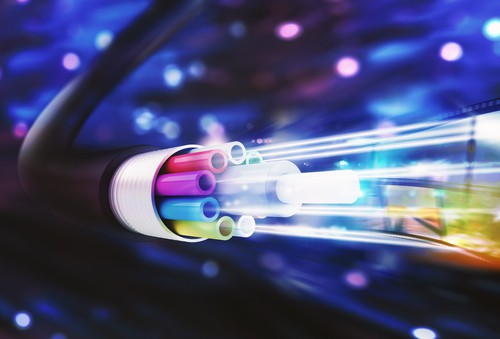When it comes to telecommunications and networking, fibre optic cable stands out as the current pinnacle of technological innovation. Offering unparalleled speed, reliability, and efficiency, fibre optic cable is now the backbone of modern communication infrastructure. In this blog post, we will outline the numerous benefits that come with choosing fibre optic cable over traditional copper wiring.
Lightning-Fast Speeds
One of the main advantages of fibre cable is its ability to transmit data at lightning-fast speeds. Unlike copper wiring, which relies on electrical signals, fibre optic cable utilises light to transmit data. This allows for significantly higher data transmission rates, making fibre optic cable the preferred choice for high-speed internet connections, large-scale data transfers, and bandwidth-intensive applications such as video streaming and online gaming.
Immunity to Electromagnetic Interference
Fibre optic cable is immune to electromagnetic interference (EMI), which is a common issue faced by traditional copper wiring. EMI can degrade signal quality and result in data loss or corruption, particularly in environments with high levels of electrical noise. By utilising light signals instead of electrical signals, fibre optic cable remains impervious to EMI, ensuring consistent and reliable data transmission even in the most demanding conditions.
Minimal Signal Degradation
Another significant advantage of fibre optic cable is its minimal signal degradation over long distances. With copper wiring, signals weaken as they travel, necessitating the use of signal boosters or repeaters to maintain signal integrity over extended distances. Fibre optic cable, however, experiences minimal signal loss, allowing for longer transmission distances without the need for additional equipment. This makes fibre optic cable ideal for telecommunications networks spanning extensive geographical areas.
Enhanced Security
Security is paramount in today’s interconnected world, and fibre optic cable offers enhanced protection for sensitive data. Unlike copper wiring, which can be susceptible to signal interception through techniques such as wiretapping, fibre optic cable is extremely difficult to tap without detection. In addition, fibre optic cable does not emit electromagnetic signals, further reducing the risk of eavesdropping. As a result, fibre optic cable is the preferred choice for transmitting confidential information in industries such as finance, healthcare, and government.
Greater Bandwidth Capacity
With the exponential growth of data consumption and the proliferation of bandwidth-intensive applications, the demand for higher bandwidth capacity has never been greater. Fibre optic cable addresses this need by offering vastly superior bandwidth capacity compared to copper wiring. This allows for seamless scalability to accommodate future growth and ensures that networks can keep pace with evolving technological advancement.
Durability and Longevity
Fibre optic cable is renowned for its durability and longevity, making it a wise investment for businesses and organisations looking to future-proof their infrastructure. Unlike copper wiring, which is susceptible to corrosion, moisture damage, and physical wear and tear, fibre optic cable is highly resistant to environmental factors and can withstand harsh conditions. In addition, fibre optic cable can offer a lifespan of 25 years or more, providing long-term reliability and cost-effectiveness.
In conclusion, the benefits of choosing fibre optic cable are undeniable. From lightning-fast speeds and immunity to electromagnetic interference to enhanced security and greater bandwidth capacity, fibre optic cable offers a host of advantages that make it the preferred choice for modern communication networks.


